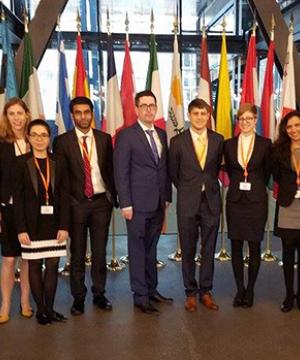An Inside View of European Union Institutions
Study trip participants, from left to right: Jordan Levi Johnson ’18, Eric Sliva ’18, Julie-Irene Nkodo ’18, Juli Brauer ’17, Ani Hamparsumyan ’17, Sadaat Cheema ’17 LL.M., Kristoffer Rakner ’17 LL.M., Aaron Rogoff ’17, Emily Hush ’18, Anjli Parrin ’17, Maria Vizdoaga ’17 LL.M., Stephen Dietz ’17 LL.M., Professor Anu Bradford |
For one week in January, a dozen upper-level Columbia Law School students began their days in Brussels and Luxembourg at 7:30 a.m., briefing each other on different areas of European Union (EU) law. Then they spent the next 15 hours in a whirlwind of activity—visiting all the EU’s key decision-making bodies and meeting with top attorneys, judges, politicians, and legal advisors in EU institutions and multinational corporations alike.
The culmination of an intensive seminar on EU law and institutions, the program was designed and led by Columbia Law School Professor Anu Bradford, an expert in EU law, antitrust law, and international trade law. The seminar—sponsored for the second time by international law firm Cleary—immerses students in EU law, and gives them rare access to key decision- and policy-makers. To prepare, Bradford assigned a series of readings related to the institutions the participants would visit, and the conversations they would be engaging in with the experts.
“The trip was a once-in-a-lifetime experience. It is no exaggeration when I say it was career-defining,” said Julie-Irene Nkodo ’18, one of students who participated in the study trip. A native of Cameroon, Nkodo is doing a joint-degree program at the University Paris 1 Pantheon-Sorbonne Law School and will join Cleary after she graduates. “Getting to understand the intricacies of the EU institutions and engage with practitioners at the highest level has made clear in my mind that I want to do something involving EU-Africa relations.”
Due to Brexit and turmoil in Europe, many of the legal professionals the students visited—some of whom had dedicated their entire careers to EU institutions—felt a greater sense of mission and urgency to their work, said Bradford, the Henry L. Moses Professor of Law and International Organization and director of the Law School’s European Legal Studies Center, who worked at Cleary for two years early in her career. “It was evident that many people had a renewed sense of purpose and were eager to share that with the students.”
The trip had several highlights. The students attended a hearing at the Court of Justice, akin to sitting in on oral arguments at the U.S. Supreme Court; after, they had a conversation and lunch with Koen Lenaerts, president of the Court. They also visited the European Parliament where they had a discussion with Syed Kamall MEP, a member of the Conservative Party who has represented London since 2005 and who voted in favor of Brexit. Marietjke Schaake MEP offered a starkly contrasting perspective, articulating her strongly pro-European view for the students.
“To be able to see politics and politicians on the ground was really valuable,” said Jordan Johnson ’18, who will also finish his law degree in Paris next year. Hearing Kamall make a case for Brexit helped him understand why many voters would be persuaded. “I think we overlook the political dimensions and extent to which people on ground who are voting and affecting the political process don’t share the same understanding as lawyers and academics.”
Nkodo agreed, adding that hearing a pro-Brexit view made her “consider [her] biases.”
READ THE FINANCIAL TIMES' ARTICLE ABOUT THE PROGRAM
On their second-to-last day in Europe, the class visited the Cleary offices and spent the afternoon with associates and partners from the firm, who shared the impactful work they’re doing. Cleary partner Nicholas Levy, one of Europe’s leading antitrust lawyers, facilitated a conversation about careers in EU antitrust law, then welcomed the students to his home for a reception.
“It was a real pleasure to host Anu and her students in Brussels,” said Levy. “Their visit came at a fascinating time, as the EU digests the implications of Brexit and President Trump. We were incredibly impressed by the group’s knowledge, enthusiasm, and stamina, and really enjoyed having them among us. It’s the second time we have sponsored this program and, as before, we thought it was a great success.”
All the students selected for the program have a background and interest in EU Law, and come from the United States, Norway, France, Australia, Kenya, Moldova, and Canada. The diversity of the students’ and speakers’ experiences and viewpoints was a key benefit of the experience. “It was fascinating to hear very different and often contrasting ideas on issues,” said Sadaat Cheema ’17 LL.M., who is from Australia and will work for a law firm in Brussels starting this fall.
Now back in Morningside Heights, the students are writing final papers on the most compelling legal topic they learned over the course of the trip, putting to use their newly acquired knowledge and deeper appreciation of the many legal issues that define the future of the EU.
Related:
“Brexit vote provides an unexpected upside for law students” (The Financial Times, March 8, 2017)
###
Homepage photo courtesy of: Gwenael Piaser
Posted on March 8, 2017
